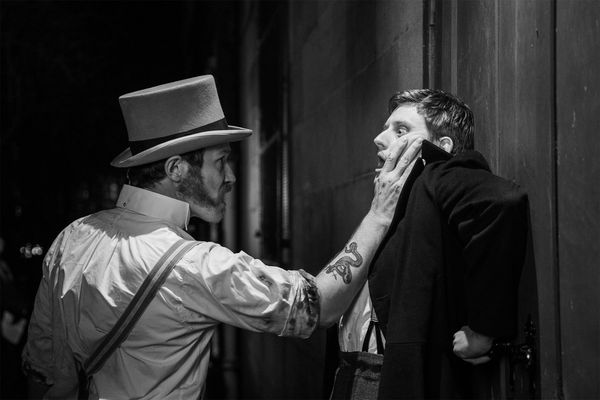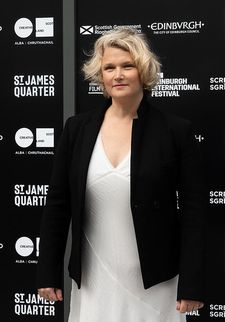 |
| Henry Pettigrew and Lorn Macdonald in The Strange Case Of Dr Jekyll And Mr Hyde Photo: Courtesy of EIFF |
Can you tell me a bit about how the hybrid worked?
 |
| Hope Dickson Leach: 'I was the bewitched by the text. It’s formally so clever and it felt like a detective story' Photo: Courtesy of EIFF/Kat Gollock |
We just started to kind of think of it differently, because on the night it was almost like someone watching your rushes or your sketches. And that's a very sort of intimate thing to do because, as a filmmaker, the edit is a really important part of it. So on the night, that live thing was quite scary, because it was just like, I have no control over this, but that was exciting as well, because that was the theatre of it.
At what point did you decide to go back to the source text, where Utterson is more dominant, as he is in the film, but broaden it out to root it more in Edinburgh, to include elements like Scotland’s Folly, for example.
HDL: Well, we went straight to the text at the beginning, that was the thing I wanted to do, because I've never actually read it. Like, many people probably knew, I felt I knew the story, but I'd never read the book. And I was the bewitched by the text. It’s formally so clever and it felt like a detective story, kind of a crime novel and I love crime. So I was like, ‘This is like a serial killer story’, essentially. We all know that Jekyll and Hyde are the same person so you don't get that thing that you would have got from the book when you read it for the first time. So it was kind of like, how do we work with this story without it just everyone sitting there going Yes, we know? So we came from assuming the audience know it, and just working with this guy who doesn't know it, and the tension, therefore, coming from, ‘Oh, when’s he going to figure this out?’ but hopefully, without getting too frustrated.
Obviously, it's set in London, but if you know Edinburgh, you read it and you're like, this is clearly Edinburgh. And it just felt working the National Theatre of Scotland and being in Edinburgh myself, it was a delicious opportunity to put it back here and to kind of have some fun exploring the city's history. And as we were developing the kind of the politics and the themes that we were really interested in, and the kind of questions of power, you know, Edinburgh just felt more and more like a rich terrain for this. This is a city of grand monuments and bodies buried under every which where, so this is a great opportunity. In the book Sir Danvers Carew (David Hayman) was just a dead body, we never really meet him. But we just thought, ‘Okay, let's make him a character, let's give him something’. And Vlad, who wrote it with me, was so great at the research and would come up with all these things, the clearances of the Cowgate, he was like, ‘Oh, my God, do you know about this?’ There are so many amazing stories.
You retain that real Gothic feel of the of original, was that what you had in mind from the start?
HDL: Totally. It was it was the black and white, expressionist, style, you know, Dr. Caligari? It was just thinking about what is theatrical filmmaking? The film noir that allows us to have big heavy conversations and make them dramatic. And obviously, we needed that for the theatre.
Gothic was considered to be transgressive and I felt that there's quite a sort of latent homoerotic tension going on there with Utterson and Hyde.
HDL: Yeah, totally. In the book, you read it, and this could absolutely be a story about coming out. There's all kinds of gay subtext and things in the book, and we made this decision that I didn't want to make it about that because I think then there's all kinds of messiness. Once you start making Hyde gay, it's like, Hyde is evil, let's not go there. But I really love this idea of just thinking about masculinity, thinking about all the kinds of ways in which Utterson is repressing different parts of his masculinity, these sexual urges, urges for power. All these things he’s got that he’s repressing. I think he is in love with Jekyll, but I think it is that he wants to be him. And that's kind of ultimately what happens. Jekyll is the perfect man for Utterson.
Can we talk about your great actors, particularly Lorn Macdonald?
HDL: I saw Beats and I got in touch with immediately I was just like, ‘I think you're a genius. And I have to work with you.’ So we were desperate to find something. He's extraordinary. He's like young Al Pacino, he needs to be a massive star. As an actor, though, he's really driven by different challenges. I think he wants real challenges. And Henry was amazing. A completely delicious cast.
Did you face any opposition to trusting the audience over the Hyde story?
HDL: No, I think I mean, that's the thing that the NTS, you know, they're very artists lead, and they're very supportive. We had a real clear vision for this, it was kind of like, you know, we're not setting it in an asylum. We're not, you know, we're not transposing it and making it a metaphor for anything. We're just doing the story. So I think at that point, you have to kind of really just plant your stick and go, right, we're going to do this, but we're making it about Utterson. It is a story about transformation and it's also a story about being two things at once, which is what you know, but let's not tell the same story that has been told 1000 times, everybody knows it. I think every but they weren't absolutely fine with that.
You also withhold the monster but you use a good device with the teeth for Hyde.
HDL: Henry, he did manage to put them in. There was one live scene, the dinner party scene, when he actually puts them in. It was a real challenge for Henry, because, you know, it's scary to take on a role that's so iconic, and find a way. The class thing became really clear for us and who gets to do whatever they want, because that's what Hyde is, he’s someone who does whatever he wants. When you read the description of Hyde in the book, and it talks about the hair on his hands, there's something about testosterone, which is really important. I think that was a really big part of it. But it's more ultimately about what Utterson is frightened off.





















